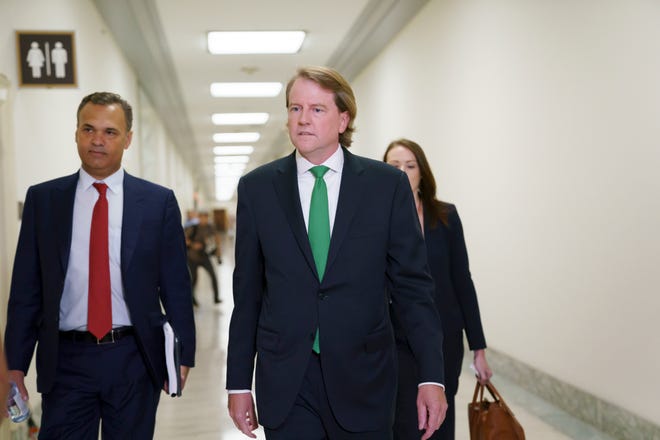
Overwhelmed by a surge in COVID-19 patients, Alaska’s largest hospital implemented crisis standards of care, prioritizing resources and treatments to those patients who have the potential to benefit the most.
“While we are doing our utmost, we are no longer able to provide the standard of care to each and every patient who needs our help,” Dr. Kristen Solana Walkinshaw, chief of staff at Providence Alaska Medical Center, wrote in a letter addressed to Alaskans distributed Tuesday.
“The acuity and number of patients now exceeds our resources and our ability to staff beds with skilled caregivers, like nurses and respiratory therapists. We have been forced within our hospital to implement crisis standards of care,” Walkinshaw wrote.
Alaska, like many places across the country, has seen a surge in coronavirus cases driven by the highly contagious delta variant. Idaho activated crisis standards of care in the northern part of the state last week because of a "severe shortage of staffing and available beds" along with "a massive increase in patients with COVID-19 who require hospitalization," the Idaho Department of Health and Welfare said.
Multiple states have warned about implementing those crisis standards due to hospitals and ICUs nearing capacity. Those standards mean hospitals with too many patients and not enough staff likely will need to triage patients, prioritizing care to those most likely to benefit when demand outstrips resources.
Also in the news:
►New York City is investigating a potential COVID-19 outbreak linked to the Electric Zoo Music Festival over Labor Day weekend, according to the city's health department.
►Texas health data showed that the number of hospital patients for COVID-19 in the state continues to decline, despite seeing thousands of new cases every day.
►New Mexico is extending its mask mandate for indoor public settings at least through mid-October as state health officials reported hopeful developments in daily cases, testing and hospitalizations.
►The U.S. will make COVID-19 vaccinations mandatory for new immigrants starting Oct. 1, U.S. Citizenship and Immigration Services announced Tuesday.
📈Today's numbers: The U.S. has recorded more than 41 million confirmed COVID-19 cases and more than 666,000 deaths, according to Johns Hopkins University data. Global totals: More than 226 million cases and 4.6 million deaths. More than 179 million Americans — 54% of the population — have been fully vaccinated, according to the Centers for Disease Control and Prevention.
📘What we're reading: As more people survive COVID-19 infections yet continue to suffer, health care has begun to respond with multidisciplinary clinics that connect patients with a range of experts. They work together to devise a plan, operating without a playbook because treatment guidelines have yet to be written. Read more here.
Keep refreshing this page for the latest news. Want more? Sign up for USA TODAY's Coronavirus Watch newsletter to receive updates directly to your inbox and join our Facebook group.

Los Angeles County to require vaccine proof for indoor bars, nightclubs
Public health officials in Los Angeles County will begin requiring proof of COVID-19 vaccination for patrons and workers at indoor bars, wineries, breweries and nightclubs next month.
The new initiative in the nation’s most populous county begins Oct. 7, with proof of at least one vaccine dose required. By Nov. 4, proof of full vaccination will be mandatory, according to the county’s Department of Public Health.
Health officials strongly recommend the same precautions for indoor restaurants but have not chosen to mandate proof of vaccination for them.
The new restrictions come ahead of the holiday season, which brought a massive surge to Los Angeles last year. More than 25,000 people have died of the virus countywide and the toll continues to climb amid the contagious delta variant.
"This is a reasonable path forward that will position us to be better able to break the cycle of surges," Barbara Ferrer, the county’s public health director, told the Board of Supervisors during a Wednesday meeting.
CDC, FDA plan meetings on who should get booster shots
Federal health officials plan several meetings this month that will determine who should receive a booster shot.
Originally, President Joe Biden had said a third shot booster dose for people with healthy immune systems would be offered beginning Sept. 20 to anyone who'd gotten their second shot of either the Pfizer-BioNTech or Moderna vaccine at least eight months ago, pending authorization from the Food and Drug Administration.
But the administration walked that back slightly over concerns the announcement got ahead of recommendations from the Food and Drug Administration and Centers for Disease Control and Prevention advisory committees.
The FDA committee will meets Friday to discuss booster recommendations; the CDC announced Wednesday their advisory committee would meet on Sept. 22 and 23rd.
The Vaccines and Related Biological Products Advisory Committee is where the FDA goes for outside advice on whether the data for drugs and vaccines shows they will be safe and effective. The committee also can grill the agency on questions it feels haven't yet been answered. The CDC's Advisory Committee on Immunization Practices develops recommendations for who should get vaccines and on what schedule. Here's more information on boosters and what to expect.
Florida's county-level COVID death data public for first time in months
Figures on COVID-19 deaths in Florida's counties quietly rematerialized this week on a federal website tracking the pandemic, more than three months after state officials stopped publicly reporting the information.
The Centers for Disease Control and Prevention now shows seven-day mortality figures for counties, but only for a recent week. For months, the CDC site showed zero deaths for all counties in Florida, though aggregate death numbers for the state were available.
The new data appeared one week after a USA TODAY Network - Florida report on the lack of accessible county death data. The state of Florida stopped reporting county-level data in early June.
Florida has not said why it's not displaying the data itself, and Health Department spokeswoman Weesam Khoury gave no indication the department intends to return those local death statistics to its weekly reports despite Gov. Ron DeSantis saying that releasing local death totals would be “appropriate.” Read more on the data.
— Frank Gluck and Chris Persaud, Fort Myers News-Press
Source link









